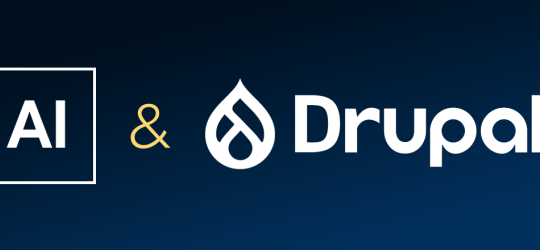AI and Drupal: Overview and Key Trends – The Present and Future of Automation.
AI-Powered Drupal - A Guide to Intelligent CMS Evolution - Part 1

Artificial Intelligence (AI) is rapidly transforming how we build and manage websites. Drupal, known for its flexibility and power, is no exception. From smarter content recommendations to automated workflows, AI is becoming a key part of the Drupal ecosystem. In this overview, we’ll summarize AI’s role in Drupal today, highlight key trends, and explore what the future may hold.
AI’s Growing Role in Drupal
Drupal has always been a robust content management system, but AI is supercharging its capabilities. Today, AI helps Drupal sites in several ways:
- Content Personalization: AI analyzes user behavior (clicks, views, time on page) to deliver content tailored to individual interests. For example, a Drupal-based news site might use AI to show science articles to a visitor who often reads science news, making the experience more engaging.
- Automated Content and Tagging: Site admins are saving time with AI tools that generate article summaries, suggest taxonomy tags, or even draft content. This means editors can focus on strategy and refinement rather than starting from scratch.
- Chatbots and Virtual Assistants: Many organizations integrate AI chatbots into their Drupal sites to handle common inquiries. These bots, powered by natural language processing, can answer questions 24/7 – improving customer service without additional staff.
- Advanced Search and SEO: AI-driven search modules for Drupal understand synonyms and user intent, helping visitors find what they need even if their search phrasing is unconventional. Likewise, AI can assist with Search Engine Optimization (SEO) by suggesting keywords or analyzing content readability.
- Security Monitoring: On the backend, AI is helping detect unusual patterns or potential threats. A machine learning system might flag an odd surge in login attempts or content changes, alerting admins to possible security issues faster than manual monitoring.
In essence, AI acts like an intelligent assistant within the Drupal platform, automating tedious tasks and uncovering insights from data. This aligns with Tactis’ perspective that technology should simplify work for humans and improve the end-user experience. Rather than replacing human creativity or decision-making, AI in Drupal augments it – allowing developers, content creators, and site owners to be more effective.
Key Trends Shaping Drupal + AI
Several important trends stand out in how AI and automation are evolving alongside Drupal:
- Deeper Core Integration: The Drupal community is actively developing modules and frameworks to bring AI capabilities directly into Drupal. A notable effort is the new Drupal AI module, which provides a common API to plug in various AI services. This kind of abstraction layer means site builders can leverage AI (for tasks like text generation or image analysis) without heavy custom code. The trend is clear: future Drupal releases and distributions are likely to bundle or officially support AI features, making them more accessible.
- Personalization at Scale: Personalization isn’t new, but AI is taking it to the next level in Drupal. Modern sites can create dynamic, one-to-one experiences for thousands of users – something only feasible with AI analyzing and segmenting visitors in real time. We’re seeing more Drupal implementations using AI-driven personalization engines that adjust content layouts, recommendations, or even tone based on who is browsing.
- Content Automation and Generative AI: With the rise of large language models (like OpenAI’s GPT), Drupal sites can generate content automatically. Blog posts, product descriptions, or social media snippets can be drafted by AI and then reviewed by humans. Additionally, AI-based tagging (for example using image recognition to tag uploaded photos) is speeding up content management. This trend is about working smarter, automating the rote parts of content creation and maintenance.
- Multichannel and Headless AI Services: Drupal’s headless (API-first) capabilities pair well with AI microservices. A trend is emerging where Drupal serves as the content hub, and AI services operate on content either before it reaches the user or in user-facing apps. For instance, a headless Drupal site might use an AI service to personalize content in a mobile app or to power a voice assistant skill, all drawing from the same Drupal content repository.
- Enhanced Drupal DevOps with AI: Beyond end-user features, AI is also creeping into the development process. We see experimental tools that can scan Drupal code for vulnerabilities or performance issues, suggest code improvements, or even write boilerplate module code based on prompts. While still early, such AI assistance could become a standard part of the Drupal developer toolkit.
Future Outlook
Looking ahead, the integration of AI in Drupal is poised to deepen. We anticipate that AI will become a standard part of Drupal site building, much like built-in caching or multilingual support. In the near future, spinning up a new Drupal site might include configuring an AI content assistant or an out-of-the-box chatbot module during the initial setup.
From Tactis’ perspective, the long-term impact of AI in Drupal will be measured by tangible improvements to user experience and efficiency. It’s not about AI for AI’s sake, but rather what it empowers organizations to do. We expect best practices to solidify around using AI ethically and effectively – for example, ensuring transparency (so users know when they’re interacting with a bot), maintaining privacy with all that user data being processed, and keeping a human in the loop for oversight.
In summary, AI is opening exciting doors for Drupal. It’s helping deliver more personalized, interactive, and secure websites while reducing manual workload. Drupal’s open-source community, true to form, is embracing these innovations and building tools to make them available to everyone. The trend is unmistakable: Drupal is evolving from a CMS into an intelligent digital experience platform. And as this happens, organizations that leverage these AI-driven capabilities (with partners like Tactis guiding strategy and implementation) will be well-positioned to engage their audiences in more meaningful, impactful ways.